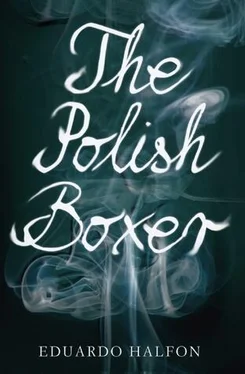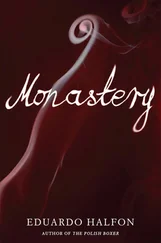Eduardo Halfon - The Polish Boxer
Здесь есть возможность читать онлайн «Eduardo Halfon - The Polish Boxer» весь текст электронной книги совершенно бесплатно (целиком полную версию без сокращений). В некоторых случаях можно слушать аудио, скачать через торрент в формате fb2 и присутствует краткое содержание. Год выпуска: 2012, Издательство: Bellevue Literary Press, Жанр: Современная проза, на английском языке. Описание произведения, (предисловие) а так же отзывы посетителей доступны на портале библиотеки ЛибКат.
- Название:The Polish Boxer
- Автор:
- Издательство:Bellevue Literary Press
- Жанр:
- Год:2012
- ISBN:нет данных
- Рейтинг книги:4 / 5. Голосов: 1
-
Избранное:Добавить в избранное
- Отзывы:
-
Ваша оценка:
- 80
- 1
- 2
- 3
- 4
- 5
The Polish Boxer: краткое содержание, описание и аннотация
Предлагаем к чтению аннотацию, описание, краткое содержание или предисловие (зависит от того, что написал сам автор книги «The Polish Boxer»). Если вы не нашли необходимую информацию о книге — напишите в комментариях, мы постараемся отыскать её.
marks the debut of a major new Latin American voice in English.
The Polish Boxer — читать онлайн бесплатно полную книгу (весь текст) целиком
Ниже представлен текст книги, разбитый по страницам. Система сохранения места последней прочитанной страницы, позволяет с удобством читать онлайн бесплатно книгу «The Polish Boxer», без необходимости каждый раз заново искать на чём Вы остановились. Поставьте закладку, и сможете в любой момент перейти на страницу, на которой закончили чтение.
Интервал:
Закладка:
I watched the ice cubes melting languidly on my grandmother’s knee.
You’ve been to Tikal, Shlomo said. I liked Tikal very much, he said, and to assure himself that he had conveyed the full extent of his enthusiasm for the Mayan ruins in the Petén jungle, he repeated it twice: Very much, very much. I said nothing. His enthusiasm, in front of a dead body, seemed out of place. I wanted to get up and tell him so, make my excuses and quietly leave my grandparents’ room. But the rabbi placed his warm, furry paw on my shoulder and, very softly, almost breathing the words down at me, began telling me about his trip, about the Mayan temples, about the heat in the jungle, the animals in the jungle, the tourists, about his guide, Juan, a squat, dark-skinned fellow and a terrific guide, he said, a very nice fellow, he said, gripping my shoulder hard, as if to keep me from moving, as if he’d guessed that I wanted to get out of there as soon as possible. Do you know Juan the guide? he asked, and I just smiled as cynically as I could. He was with us the whole day, Juan, and at the end of the day, he asked us if we wanted to see the sunset from one of the temples, I don’t remember which, maybe the biggest and tallest one. Shlomo looked up at the ceiling of my grandparents’ bedroom, metaphorically. He could take us up there, he said. From up there, he said, we’d have a great view of the sun going down over the jungle canopy.
He was interrupted by the noise of sandals in the corridor. I knew right away that it was Julie, the Salvadorean lady who had been working for twenty years as my grandparents’ cook.
Julie came into the bedroom and walked straight over to me. I wanted to get up and hug her, but the weight of something — possibly the rabbi’s hand on my shoulder — prevented me. Julie smiled with her gold and silver teeth. We gave each other a sideways hug. Don León is resting at last, she said, and turned toward the maroon-and-black-checkered quilt, and I remembered the last time I had seen my grandfather alive, or at least still with a little life left in him, a few weeks earlier, when I had just gotten back from a long trip to the Balkans (chasing ghosts) and Portugal (tearing realities). I’d come to my grandfather’s house to say goodbye, and I knew it was for the last time. He was already very ill. Almost unconscious. Frail and thin, his skin yellowing and flaky. He was delirious. He thought he could see his mother. He thought he was surrounded by German soldiers. My uncles and aunts were having coffee in the dining room, my cousins watching a Spanish league match in the living room. I peered tentatively into the bedroom, and then stood in the doorway watching Julie, who was kneeling on the carpet beside the bed, stroking my grandfather’s forehead. I didn’t go in. There was no need. I said goodbye to my grandfather for the last time in silence, from the doorway, while I watched Julie on her knees in her white uniform, and listened to the way she whispered to my grandfather. Futile words, pious words, words of encouragement and tenderness.
Julie sat down next to my grandmother on the bed. She took my grandmother’s hand. Would you like anything, Doña Matilde? she asked. But my grandmother didn’t reply. Doña Matilde, I said would you like anything? With an effort, my grandmother roused herself and said no, nothing, thank you very much. Julie quickly got up. She sighed. I made crabapples in syrup, she said to me, already on her way over to the door, her back to us. She knew how much I liked her crabapples in syrup. I put some in a jar for you, she said. Don’t leave without your jar.
My grandmother adjusted the bag of ice on her knee and the rabbi squeezed my shoulder to get my attention. And so, he said, we went up to the temple in Tikal to see the sunset.
I felt something in my belly. Rage, perhaps.
From up there the jungle went on forever, the rabbi whispered, rubbing at his matted beard. The sun was orange, and it was going down, and it was as if it was disappearing into the trees. An incredible sight, he said.
My grandmother began to cough. She covered her mouth with a dirty handkerchief.
There was a Mayan man up there, in the temple, said Shlomo. He was sitting up there. Barefoot. Dark-skinned. His leather and rubber sandals to one side. He had a pad open on his lap and he was sketching the sunset.
My grandmother carried on coughing quietly into the handkerchief. Shlomo shot her a look, as if to make her shut up.
The man was sketching the sunset, repeated Shlomo, one hand still on my shoulder, the other drawing something invisible in the air. But he sketched it like this, really quickly, said Shlomo, maybe imitating the action. He’d make a very quick sketch with his colored crayons and then he’d tear out that sheet and throw it down on the top of the Mayan temple, on the stones of his ancestors, and he’d begin again, sketching another sunset. Do you understand? Because every sketch was different, every sunset was different, as if there were many sunsets. Everything was changing very quickly. The passage of the clouds, the position of the sun, the color of the sky. Everything. And the man was sketching these changes in a hurry. Capturing them, there on his sheets of paper. He was registering the various moments of a sunset on his sheets of paper, or something like that, said Shlomo. But instead of with a camera, he was doing it with his eyes and his hands and his colored crayons. With his imagination. An incredible sight, he said, excited, so excited that he was no longer speaking in whispers but in a loud, lofty, almost mythic tone. And the Mayan man, the rabbi went on, he just left his sketches strewn across the temple, and the wind started blowing some of them around. As if they didn’t matter to him or as if the actual drawings weren’t what really mattered. Shlomo leaned in farther still, coming even closer to me. And get this, he said warmly. We tourists, all ten or fifteen of us, virtually forgot about the sunset over the jungle and just stood watching this Mayan man sketching it with his colored crayons. Incredible, isn’t it? The artist and his sunset art became more interesting to us than the sunset itself. Shlomo smiled down at me through his grubby red beard. You do understand, right? You must understand.
He paused. People were approaching along the corridor. I took advantage of the pause to remove the rabbi’s hand from my shoulder, and he seemed perplexed, offended almost, as I jumped up from the chair.
Two old men came in wearing black jackets, black ties, and black expressions. Two of my grandfather’s friends, I guessed. I didn’t recognize them, but they seemed to know me and came up and both said how sorry they were, that Don León had been a great man, a great Jew, a great survivor. And as they went on speaking, I thought about the number tattooed on my grandfather’s forearm. I thought about the five digits, green, faded, already dying on my grandfather’s forearm beneath that thick maroon-and-black quilt. I thought about Auschwitz. I thought about tattoos, about numbers, about sketches, about temples, about sunsets. I thought about telling the two old men they’d gotten it wrong, that first and foremost my grandfather had been a great whiskey drinker, an expert whiskey drinker. But I only murmured yes, he was, thank you, while for the first time I felt like crying and I started backing away from the vague little shape that had been my grandfather and ran out of the room and out of the house, and outside, already a long way from it all, I finally took off the white skullcap and threw it in a garbage can.
About the Author
EDUARDO HALFON was born in Guatemala City, moved to the U.S. at the age of ten, went to school in South Florida, studied Industrial Engineering at North Carolina State University, and then returned to Guatemala to teach literature for eight years at Universidad Francisco Marroquín. Named one of best young Latin American writers by the Hay Festival of Bogotá, he is also the recipient of the prestigious José María de Pereda Prize for the Short Novel and has published nine books of fiction in Spanish. In 2011 he received a Guggenheim Fellowship to work on continuing the story of The Polish Boxer , which is inspired by his own family history and is the first of his novels to be published in English. Halfon currently lives in Nebraska and travels frequently to Guatemala.
Читать дальшеИнтервал:
Закладка:
Похожие книги на «The Polish Boxer»
Представляем Вашему вниманию похожие книги на «The Polish Boxer» списком для выбора. Мы отобрали схожую по названию и смыслу литературу в надежде предоставить читателям больше вариантов отыскать новые, интересные, ещё непрочитанные произведения.
Обсуждение, отзывы о книге «The Polish Boxer» и просто собственные мнения читателей. Оставьте ваши комментарии, напишите, что Вы думаете о произведении, его смысле или главных героях. Укажите что конкретно понравилось, а что нет, и почему Вы так считаете.












